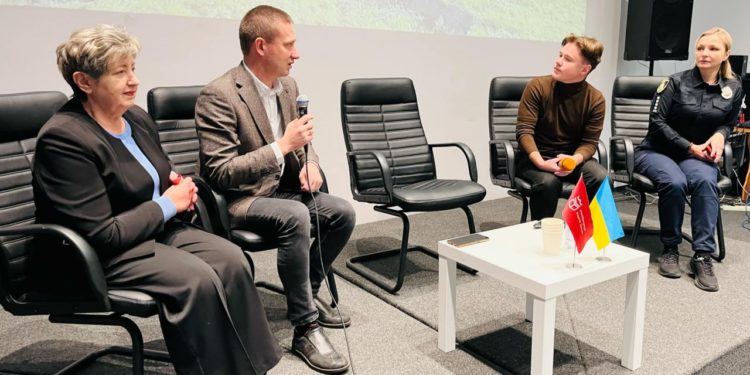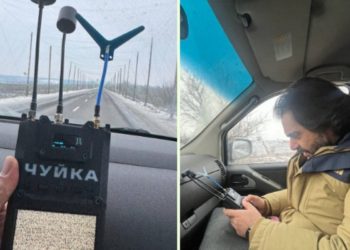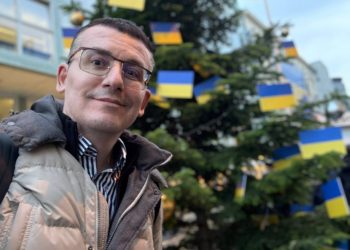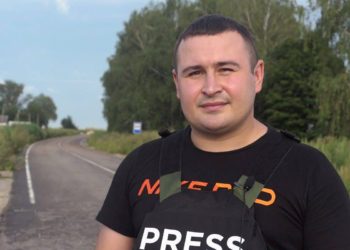“Nowadays, when we live in conditions of war, the problem of cybersecurity is becoming especially acute. Cybercriminals are trying to actively operate on the Internet, attacking people. Their main goal is to steal information about your money. Given this, it is worth protecting your data, social media pages, and gadgets to counteract online fraud,” said Oleksandr Ostrohliad, associate professor, professor of the Department of Law and Public Administration of King Danylo University, who was the moderator of the educational and practical training on cybersecurity and information protection in martial law. The event was held in Ivano-Frankivsk.
The participants in the training were local media workers and students of the departments of journalism, advertising, public relations and law enforcement of King Danylo University. The speakers of the event are Viktoriya Plakhta, the coordinator of the Ivano-Frankivsk Journalists’ Solidarity Center (JSC); Oleksandra Babetska, the head of the public relations department of the Patrol Police Department in Ivano-Frankivsk Region; Nazar Kliufinskyi, a senior operational officer of the Cybercrime Countermeasures Department in Ivano-Frankivsk Region of the Cyberpolice Department of the National Police of Ukraine; Stepan Penkaliuk, a correspondent at Social. Ivano-Frankivsk.
The speakers told the training participants, in particular, about the risks associated with the security of using social networks, making purchases online, and cyberbullying and provided important advice and recommendations.
How to minimize the risks of falling into the hands of Internet criminals: basic recommendations from Oleksandra Babetska:
- create reliable, complex passwords, and do not use the same password for several resources. The password should contain at least eight characters, letters, numbers and special characters, and should not contain personal data. If possible, update passwords to accounts and change passwords on email accounts;
- enable two-factor authentication wherever possible. Then, to log in to your account, in addition to your username and password, you will need to enter a confirmation code sent to your phone, email, or the appropriate application;
- do not follow suspicious hyperlinks, even if they came in a letter from a friend. Remember that hackers could hack his accounts and send links from them that hide a virus or phishing resource. In most cases, infected letters arrive by email;
- check the correctness of the URL of the necessary site. Any inaccuracies may mean that you have landed on a phishing resource;
- do not enter any confidential data on unfamiliar sites, and do not share such data with third parties;
- create backup copies. This will save you from losing important information;
- download programs and applications only from official sources;
- install operating system updates in a timely manner;
- if possible, it is worth storing important data on encrypted or external media.
It was also about threats to mobile devices. Nazar Kliufinskyi noted that you should not keep your smartphone constantly turned on because it is connected to the Internet and contains various input/output devices: a microphone, video, camera, GPS navigator, and more. Money accounts are often linked to a smartphone – with a mobile operator or bank accounts. All this increases the danger.
The cyber police officer also told how to protect pages on social networks, instant messengers, and email from hacking. In particular, about such a security function as multi-factor authentication, or, as it is also called, “two-factor.” When setting up such a function to log in to your account, in addition to your login and password, you need to specify an electronic key or confirmation code that should be sent to your smartphone, email, or the appropriate application. This should be done in cases where your account will be logged in from an unknown browser or mobile device.
How does “two-factor” protect against fraudsters? Even if a fraudster finds out your password, he will not be able to access your account without additional confirmation. Look for such a function in the settings or follow the links and set up multi-factor authentication for your accounts.
Stepan Penkaliuk drew attention to the issue of maintaining information silence. He drew the attention of media professionals to the importance of presenting information on television, taking into account the conditions of martial law, compliance with journalistic ethics, etc. The journalist also noted that it is worth trusting only verified sources – official and authoritative. However, everyone is vulnerable to hacker attacks. Hence, the easiest way to make sure the information is reliable is to check it in three authoritative sources. Still, it should not be some unknown site that you have seen for the first time.
NOTE. The training was organized by the Dean’s Office of the Faculty of Social and Applied Sciences of King Danylo University, the Ivano-Frankivsk Center for Journalistic Solidarity, the Ivano-Frankivsk Regional Union of Journalists, the Department of Journalism, Advertising and Public Relations of King Danylo University, together with specialists from the cyber police and the police of the Main Directorate of the State Emergency Service in the Ivano-Frankivsk region.
Call the Ivano-Frankivsk JSC at 066 677 0726 (Viktoriya Plakhta, the coordinator of the Ivano-Frankivsk Center). The Center’s address is 25 Sichovykh Striltsiv Street.
About JSC
The Journalists’ Solidarity Centers are an initiative of the NUJU implemented with the support of the International and European Federations of Journalists, as well as UNESCO. The initiative is designed to help media representatives working in Ukraine during the war. The JSCs operate in Kyiv, Lviv, Ivano-Frankivsk, Chernivtsi, Zaporizhzhia, and Dnipro and provide journalists with organizational, technical, legal, psychological, and other types of assistance.
About UNESCO
UNESCO is the United Nations Educational, Scientific and Cultural Organization. It contributes to peace and security by promoting international cooperation in education, sciences, culture, communication, and information. UNESCO promotes knowledge sharing and the free flow of ideas to accelerate mutual understanding. It is the coordinator of the UN Action Plan on the Safety of Journalists and the Issue of Impunity, which aims to create a free and safe environment for journalists and media workers, thus strengthening peace, democracy, and sustainable development worldwide. UNESCO is working closely with its partner organizations in Ukraine to provide support to journalists on the ground.
The designations employed and the presentation of material throughout this digest do not imply the expression of any opinion whatsoever on the part of UNESCO concerning the legal status of any country, territory, city, or area or its authorities or concerning the delimitation of its frontiers or boundaries. The authors are responsible for the choice and the presentation of the facts contained in this digest and for the opinions expressed therein, which are not necessarily those of UNESCO and do not commit the Organization.
Bohdana Zasidko
Ivano-Frankivsk JSC

 THE NATIONAL UNION OF
JOURNALISTS OF UKRAINE
THE NATIONAL UNION OF
JOURNALISTS OF UKRAINE
















Discussion about this post